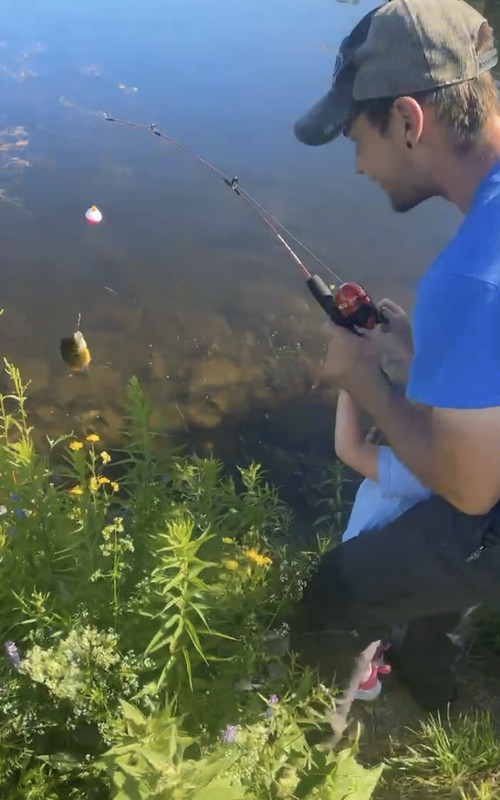- Welcome to FinsandFur.net Forums.
Recent posts
#1
Fishing Photos / Re: Fishin Gal!
Last post by Hawks Feather - Today at 08:39:53 PMNothing like getting started early in life. 

#3
Fishing Photos / Re: Fishin Gal!
Last post by FinsnFur - Today at 07:30:53 PMI can relate to the screaming fits 

#4
Fishing Photos / Fishin Gal!
Last post by nastygunz - Today at 06:58:18 PMLil lady latched on a big bluegill, she actually hooked it herself and then had a bit of a panic and had to get an assist from dad lol. My little niece, kid is a riot, she loves to fish and is very articulate, she looked at that fish and said that's a beauty!. She wants to go fishing constantly and her mother said sometimes when she tells her they can't go she has a screaming fit ha ha ha.






#5
The Tailgate / Today in history 7-7
Last post by remrogers - Today at 09:24:36 AM1797
July 7
First impeachment of a U.S. Senator
For the first time in U.S. history, the House of Representatives exercises its constitutional power of impeachment and votes to charge Senator William Blount of Tennessee with "a high misdemeanor, entirely inconsistent with his public duty and trust as a Senator."
In 1790, President George Washington appointed Blount, who had fought in the American Revolution, as governor of the "Territory South of the River Ohio," now known as Tennessee. Although he was a successful territorial governor, personal financial problems led him to enter into a conspiracy with British officers to enlist frontiersmen and Cherokee Indians to assist the British in conquering parts of Spanish Florida and Louisiana. Before the conspiracy was uncovered, Blount presided over the Tennessee Constitutional Convention and in 1796 became the state's first U.S. senator.
The plot was revealed in 1797, and on July 7 the House of Representatives voted to impeach Senator Blount. The next day, the Senate voted by a two-thirds majority to expel him from its ranks. On December 17, 1798, the Senate exercised its "sole power to try all impeachments," as granted by the Constitution, and initiated a Senate trial against Blount. As vice president of the United States, Thomas Jefferson was president of the Senate and thus presided over the impeachment trial proceedings. After two months, Jefferson and the Senate decided to dismiss the charges against Blount, determining that the Senate had no jurisdiction over its own members beyond its constitutional right to expel members by a two-thirds majority vote. By the time of the dismissal, Blount had already been elected as a senator to the Tennessee state legislature, where he was appointed speaker. The constitutional conundrum of conducting a trial of an impeached senator has not yet been resolved.
July 7
First impeachment of a U.S. Senator
For the first time in U.S. history, the House of Representatives exercises its constitutional power of impeachment and votes to charge Senator William Blount of Tennessee with "a high misdemeanor, entirely inconsistent with his public duty and trust as a Senator."
In 1790, President George Washington appointed Blount, who had fought in the American Revolution, as governor of the "Territory South of the River Ohio," now known as Tennessee. Although he was a successful territorial governor, personal financial problems led him to enter into a conspiracy with British officers to enlist frontiersmen and Cherokee Indians to assist the British in conquering parts of Spanish Florida and Louisiana. Before the conspiracy was uncovered, Blount presided over the Tennessee Constitutional Convention and in 1796 became the state's first U.S. senator.
The plot was revealed in 1797, and on July 7 the House of Representatives voted to impeach Senator Blount. The next day, the Senate voted by a two-thirds majority to expel him from its ranks. On December 17, 1798, the Senate exercised its "sole power to try all impeachments," as granted by the Constitution, and initiated a Senate trial against Blount. As vice president of the United States, Thomas Jefferson was president of the Senate and thus presided over the impeachment trial proceedings. After two months, Jefferson and the Senate decided to dismiss the charges against Blount, determining that the Senate had no jurisdiction over its own members beyond its constitutional right to expel members by a two-thirds majority vote. By the time of the dismissal, Blount had already been elected as a senator to the Tennessee state legislature, where he was appointed speaker. The constitutional conundrum of conducting a trial of an impeached senator has not yet been resolved.
#7
Fishing Photos / Re: River Wolf
Last post by Hawks Feather - Yesterday at 11:08:48 AMLooked like you still had all of your fingers at the end which is a good thing.
#8
The Tailgate / Today in history 7-6
Last post by remrogers - Yesterday at 09:34:49 AM1785
July 6
Continental Congress sets the dollar as the official U.S. currency
On July 6, 1785, the Continental Congress establishes the dollar as the official currency of the newly established United States, paving the way for a national monetary system.
The fledgling nation had just won the Revolutionary War, and the creation of a national currency marked one of its first steps in stabilizing and establishing its newly independent economy.
Prior to the war, England would not supply the colonies with a sufficient number of pence and shilling coins, It also would not allow the colonies to create their own coin currency. So the colonists would often use coins from other European nations, including Spain, France and Portugal, or they would barter for goods using such things as Indian wampum or tobacco.
To get around Britain's rules, the Massachusetts Bay Colony started producing its own paper currency in 1690. Other colonies followed Massachusetts' lead and produced paper notes, which were then used for the exchange of goods or payments within the state or colony that issued it. Among other things, these notes—called bills of credit—were issued as mortgage loans to residents of the individual colonies. As collateral, the residents pledged their lands.
While the issuance of paper currency helped alleviate the coin shortage, it also created confusion since it was difficult to determine the true value of the various paper and coin currencies in circulation. It also gave rise to a rash of counterfeiting.
It wasn't until 1775 that the Continental Congress issued a universal paper currency to help fund the Revolutionary War. But the currency, which was issued in the form of $2 notes known as "Continentals," quickly became worthless due to a lack of solid backing by the government.
After the war, the new nation sought to stabilize its economy. In 1785, it established the dollar as America's new monetary unit, basing it on the widely used Spanish silver dollar. (And the dollar sign was adapted from the Spanish-American symbol for the peso.) The founding fathers then adopted a base-10 monetary system, in which ten cents make a dime and ten dimes make a dollar.
It took decades before the dollar was fully adopted and embraced in the U.S., but today, it evolved into one of the most widely held currencies in the world.
July 6
Continental Congress sets the dollar as the official U.S. currency
On July 6, 1785, the Continental Congress establishes the dollar as the official currency of the newly established United States, paving the way for a national monetary system.
The fledgling nation had just won the Revolutionary War, and the creation of a national currency marked one of its first steps in stabilizing and establishing its newly independent economy.
Prior to the war, England would not supply the colonies with a sufficient number of pence and shilling coins, It also would not allow the colonies to create their own coin currency. So the colonists would often use coins from other European nations, including Spain, France and Portugal, or they would barter for goods using such things as Indian wampum or tobacco.
To get around Britain's rules, the Massachusetts Bay Colony started producing its own paper currency in 1690. Other colonies followed Massachusetts' lead and produced paper notes, which were then used for the exchange of goods or payments within the state or colony that issued it. Among other things, these notes—called bills of credit—were issued as mortgage loans to residents of the individual colonies. As collateral, the residents pledged their lands.
While the issuance of paper currency helped alleviate the coin shortage, it also created confusion since it was difficult to determine the true value of the various paper and coin currencies in circulation. It also gave rise to a rash of counterfeiting.
It wasn't until 1775 that the Continental Congress issued a universal paper currency to help fund the Revolutionary War. But the currency, which was issued in the form of $2 notes known as "Continentals," quickly became worthless due to a lack of solid backing by the government.
After the war, the new nation sought to stabilize its economy. In 1785, it established the dollar as America's new monetary unit, basing it on the widely used Spanish silver dollar. (And the dollar sign was adapted from the Spanish-American symbol for the peso.) The founding fathers then adopted a base-10 monetary system, in which ten cents make a dime and ten dimes make a dollar.
It took decades before the dollar was fully adopted and embraced in the U.S., but today, it evolved into one of the most widely held currencies in the world.
#9
Fishing Photos / River Wolf
Last post by FinsnFur - Yesterday at 08:32:40 AMWish I woulda had the Go Pro on this one, took several minutes to get her calmed down enough to pluck it out without a net. 

#10
The Tailgate / Re: Happy Independence Day
Last post by FinsnFur - Yesterday at 06:39:02 AMQuote from: Hawks Feather on July 04, 2025, 10:27:45 AMThanks and right back at you.
I assume you will be working on your tan again by going to the river and claiming to fish.
I've been accused of that before and thats how it seems as of late.
 Been pretty tough to catch anything lately.
Been pretty tough to catch anything lately. 